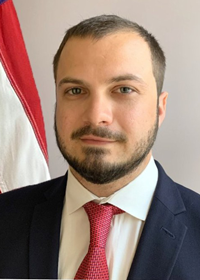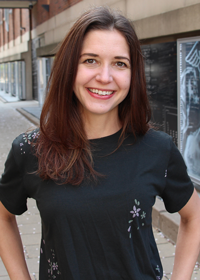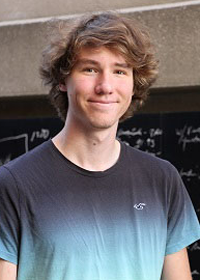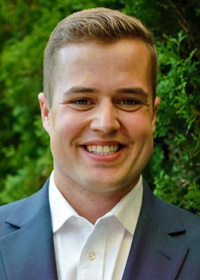Session Organizers: Bradley Drahos, University of Minnesota and Nichole Morris, University of Minnesota
This session will survey challenges facing combat medicine/first responder training and accreditation. Research and capabilities discussed during this session align with the United States Army Simulation and Training Technology Center's aims to identify and mitigate challenges with inconsistent training, review devices used in training and associated fidelity concerns, and continue to implement the use of diverse simulation methods to address training limitations.
Overview of AFL DEVCOM Soldier Center Mission
Abstract: The DEVCOM Soldier Center STTC sponsors and executes applied research to address training gaps that affect soldier care. Topics of interest include, gender based care differences, multi-modal automated performance assessments, medical training in synthetic training environments, standard and prolonged combat casualty care. The specific area of combat casualty care will be surveyed along with major challenges: how do we ensure a combat medic is battlefield ready after a few months of training? Now that female soldiers are cleared for combat duty, will female casualties receive the same standard of care as male casualties? Do any first responder training programs, either military or civilian, address such issues? The talk will conclude by briefly introducing the iSTEAM project: “Improved Synthetic Training Environment for Assessment of Medics (iSTEAM): Competency Through Video Analysis”
Jack Norfleet, PhD
Jack Norfleet is the Chief Engineer for Medical Simulation Research at the Simulation and Training Technology Center (STTC) of the DEVCOM Soldier Center under Army Futures Command. He executes medical simulation R&D while managing a multidisciplinary team of engineers and scientists. The STTC has teamed with industry and academia to address gender based medical treatment disparities.

Mark Mazzeo
DEVCOM Soldier Center under Army Futures Command
Mark Mazzeo is an Industrial Engineer for the Medical Simulation Research team and International Programs Lead at the Simulation and Training Technology Center (STTC) of the DEVCOM Soldier Center under Army Futures Command. He executes medical simulation R&D programs involving severe trauma simulations, including ocular and female trauma. The STTC partners with researchers, militaries, and governments worldwide to improve training.
Results of University Simulation Center Survey

Katelyn Schwieters
HumanFIRST Laboratory, Mechanical Engineering, University of Minnesota
Abstract: An inventory survey of existing patient simulator and manikin equipment currently available in college and university simulation facilities in the United States was completed to assess trends in equipment representation and availability. Count information was collected on patient simulator and manikin manufacturers, models, and characteristics (e.g., gender, skin tone, race/ethnicity). Additionally, we collected information to understand what factors influence equipment purchasing decisions as well as information to understand barriers to purchasing diverse patient simulators and manikins.
Bio: Katelyn R. Schwieters, M.A. is an assistant scientist in the HumanFIRST Laboratory at the University of Minnesota. Katelyn is also a third-year PhD student in the Human Factors and Ergonomics program at the University of Minnesota.
Effect of Patient Gender and Undressing Method on Chest Exposure in a Combat Care Scenario
Abstract: A sizeable body of research suggests that bystanders are more reluctant to treat female patients due to misconceptions about women in medical distress, fears of causing injury (i.e., beliefs that women are fragile), concerns over physical barriers (i.e., female breasts), and fears of having to remove clothing (i.e., exposing the patient). This can extend to combat medicine and result in worsened health outcomes for female soldiers. This presentation will explore how simulation manikin gender, undressing method, and degree of chest exposure can predict differences in the treatment of a gunshot wound to the chest in a simulated combat care scenario. Study participants included combat medics (68W) and combat lifesavers (CLS) undergoing training at Joint Base Lewis-McChord. Follow-up interviews with medics identify factors that may have led to differences in undressing and treatment decisions.

William Kessler
HumanFIRST Laboratory, Mechanical Engineering, University of Minnesota
Bio: William Kessler is an assistant scientist in the HumanFIRST Laboratory at the University of Minnesota. He graduated from Minnesota State University, Mankato in 2022 with a BS in psychology. He has research emphasis in roadway safety and gender disparity in medical care.

Marshall Mabry
Assistant Scientist, HumanFIRST Laboratory, University of Minnesota
Bio: Marshall Mabry is an assistant scientist in the HumanFIRST Laboratory at the University of Minnesota with research emphasis in roadway safety and gender disparities in medical care. He graduated from the University of Minnesota with a BA in urban studies.
M Simulation Standardized Patients Overview
Abstract: M Simulation is one of the most active comprehensive healthcare simulation education programs of its kind in the United States designing, implementing, and assessing over 40,000 annual learner contact hours. M Simulation supports an expansive educational project portfolio
utilizing a range of simulation modalities including Human Simulation–comprised of onsite and online arms of the standardized patient (SP) program, Technical/Procedural simulation, and is also equipped to provide video production services.
In May 2020, the M Simulation team moved into a brand new, 24,000 square foot state-of-the-art facility, equipped to solve the next generation of healthcare education needs. In this new environment, M Simulation collaborates with schools and programs across the University of Minnesota Twin Cities and system campuses. The team also collaborates with external education and industry stakeholders to design effective simulation training experiences, assessments, and research.
During this panel discussion we will provide an overview of the M Simulation and HumanFIRST Laboratory collaboration to support gender equity in healthcare for military service members. Discussion points will include working with SPs and high fidelity manikins to create realistic environments that enhance HumanFIRST Labs combat medicine/first responder research.

Lou Clark
University of Minnesota | M Simulation
Dr. Lou Clark is the Executive Director of the M Simulation Lab which provides simulation education across UMN health sciences professions and schools. Prior to joining UMN, she served as the Deputy Director of Clinical Simulation at the Val G. Hemming Simulation Center at Uniformed Services University of the Health Sciences. Her research focuses on compassionate communication in healthcare training and standardized patient (SP) methodology. She currently serves as the President-Elect for the Association of SP Educators.

Eugene Floersch
University of Minnesota | M Simulation
Eugene Floersch (E.B.) is the Assistant Director of M Simulation at the University of Minnesota. He served as an Army Combat Medic/Lead Instructor and brings that experience with him when planning courses and research. Developing curriculum adaptations, enhancing medical research, and creating innovative task trainers are his primary focuses in simulation. With his Master of Public Health (MPH) degree, E.B. brings a unique perspective to simulation development with his academic focus aiming at improving global emergency response and preparedness.
Session Organizer Bio

Nichole Morris, Research Associate Professor, Mechanical Engineering, University of Minnesota
Dr. Nichole Morris, director of the HumanFIRST lab in the Department of Mechanical Engineering at the University of Minnesota, is the Principal Investigator of the iSTEAM Cooperative agreement sponsored by U.S. Army Combat Capabilities Development Command. She is an expert in human factors and her research focuses on human-systems interactions, leveraging user-centered design to reduce serious injuries and fatalities.

Bradley Drahos
University of Minnesota
Bradley Drahos is an assistant scientist in the HumanFIRST Laboratory at the University of Minnesota with research emphasis in leveraging simulation to improve human-system interactions in roadway safety and combat medicine. He graduated from the University of Minnesota with a BS in mechanical engineering and is currently a first-year MS student in the Human Factors and Ergonomics masters program at the University of Minnesota.